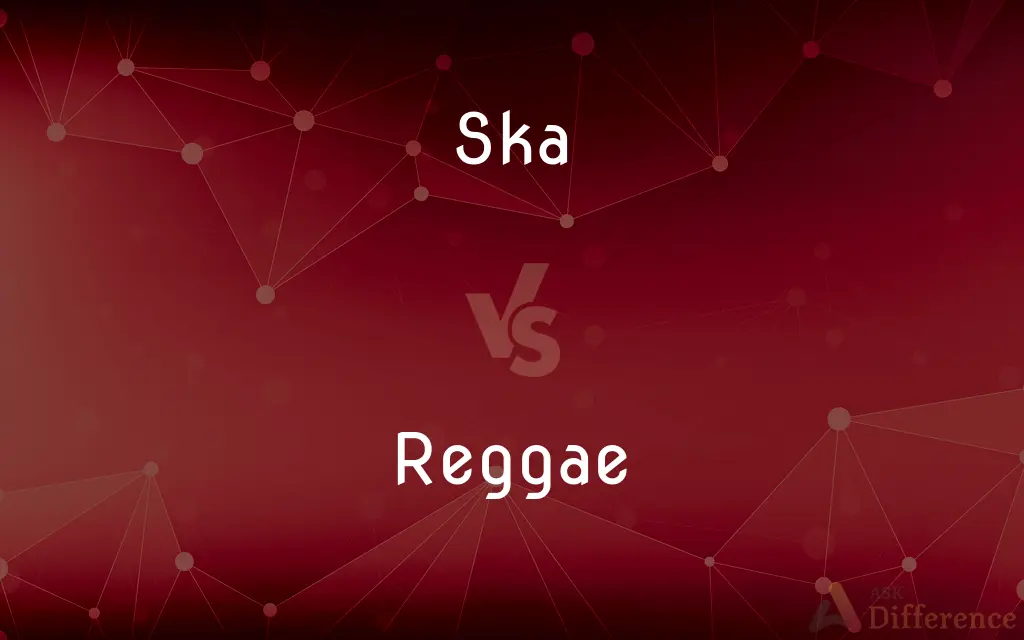Ska vs. Reggae — What's the Difference?
By Maham Liaqat & Fiza Rafique — Updated on March 30, 2024
Ska is fast-paced, rhythm-focused music genre originating in Jamaica in late 1950s, characterized by prominent brass section. Reggae is slower, more relaxed genre that emerged in late 1960s, known for its rhythmic emphasis on the offbeat and lyrics.

Difference Between Ska and Reggae
Table of Contents
ADVERTISEMENT
Key Differences
Ska music emerged in Jamaica in the late 1950s as a precursor to reggae, blending elements of Caribbean mento and calypso with American jazz and rhythm and blues. It is marked by a walking bass line, rapid tempo, and the use of brass instruments. Its upbeat and energetic rhythm made it popular for dancing. In contrast, reggae developed in the late 1960s and early 1970s, slowing down ska's tempo and introducing more emphasis on the backbeat, known as the "one drop" rhythm. Reggae music often carries messages of peace, love, and social justice, reflecting its roots in the Rastafarian movement.
Ska experienced several revivals over the decades, notably the 2 Tone movement in the UK during the late 1970s and early 1980s, which fused ska with punk rock influences. Reggae, on the other hand, has maintained a steady presence on the world stage, largely due to the international success of artists like Bob Marley, who played a significant role in spreading its messages worldwide.
The instrumentation in ska typically includes guitars, bass, drums, saxophones, trumpets, and trombones, playing in a syncopated style that emphasizes the "off" beat. In reggae, the rhythm guitar often plays on the offbeat as well, but the overall feel is more laid-back, and the bass lines are more pronounced and melodic, playing a crucial role in the music's texture.
Both ska and reggae have had a profound influence on global music, contributing to the development of other genres such as rocksteady, dub, and dancehall. While ska's popularity has waxed and waned, it has maintained a dedicated following. Reggae, with its universal themes and slower, more accessible tempo, has remained a powerful force in music, influencing genres and artists around the world.
Comparison Chart
Tempo
Fast-paced
Slower, relaxed
ADVERTISEMENT
Rhythm
Emphasis on the offbeat guitar rhythms
Rhythmic emphasis on the offbeat, "one drop" rhythm
Themes
Often light-hearted, with a focus on dancing
Social justice, peace, and love
Instrumentation
Brass section, guitars, bass, drums
Prominent bass lines, rhythm guitar on the offbeat
Origins
Late 1950s, Jamaica
Late 1960s, Jamaica
Cultural Impact
Led to reggae and influenced 2 Tone in the UK
Global influence, associated with Rastafarianism
Compare with Definitions
Ska
Known for its upbeat rhythm and brass section.
Ska bands often feature energetic brass sections and offbeat guitar chords.
Reggae
A music genre characterized by a slower tempo and socially conscious lyrics.
Bob Marley used reggae music to spread messages of peace and unity.
Ska
Experienced revivals, notably with the UK's 2 Tone movement.
The Specials fused ska with punk influences during the 2 Tone era.
Reggae
Instrumentation focuses on the rhythm section and offbeat guitar chords.
The characteristic reggae sound comes from its emphasis on bass and rhythm guitar.
Ska
Focuses on themes of fun and dancing.
Ska concerts are known for their lively atmosphere and dancing crowds.
Reggae
Gained international fame, influencing various music genres.
Artists worldwide have incorporated reggae's relaxed rhythm and themes into their music.
Ska
A fast-paced music genre combining Caribbean mento and calypso with American jazz.
The Skatalites are considered pioneers of ska music.
Reggae
Emphasizes rhythmic bass lines and the "one drop" rhythm.
The Wailers were masters of the reggae beat, focusing on slow, steady rhythms.
Ska
Instrumentation includes guitars, bass, drums, and horns.
Ska music's distinct sound is characterized by the interplay of brass instruments and rhythm section.
Reggae
Associated with the Rastafarian movement.
Reggae music often includes references to Rasta beliefs and the call for social justice.
Ska
Ska (; Jamaican: [skjæ]) is a music genre that originated in Jamaica in the late 1950s and was the precursor to rocksteady and reggae. It combined elements of Caribbean mento and calypso with American jazz and rhythm and blues.
Reggae
Reggae () is a music genre that originated in Jamaica in the late 1960s. The term also denotes the modern popular music of Jamaica and its diaspora.
Ska
Popular music originating in Jamaica in the 1960s, having elements of rhythm and blues, jazz, and calypso, a fast tempo, and a strong accent placed on the offbeat.
Reggae
Popular music of Jamaican origin having elements of Calypso and rhythm and blues, usually with an accent placed on the offbeat.
Ska
(music genre) A style of Jamaican dance music originating in the late 1950s, combining elements of Caribbean calypso and mento with American jazz and rhythm and blues; it was the precursor to rocksteady and reggae.
Reggae
A music genre that originated in Jamaica in the late 1960s and is heavily associated with Rastafarianism, featuring a heavy bass line and percussive rhythm guitar on the offbeat, often with close vocal harmonies.
Reggae
Popular music originating in the West Indies; repetitive bass riffs and regular chords played on the off beat by a guitar
Common Curiosities
How did reggae evolve from ska?
Reggae evolved from ska by slowing down the tempo and adding greater emphasis on lyrical themes of social justice and the "one drop" rhythm.
Can the influence of American music be seen in both ska and reggae?
Yes, both genres were influenced by American jazz, rhythm and blues, integrating these elements into their distinct sounds.
What is the main difference between ska and reggae?
The main difference lies in their tempo and rhythm, with ska being fast-paced and reggae featuring a slower, more relaxed beat.
What was the 2 Tone movement?
The 2 Tone movement was a revival of ska in the UK during the late 1970s, blending it with punk rock influences and themes of racial unity.
Are there any significant cultural differences between ska and reggae audiences?
While both have diverse global audiences, ska often attracts fans of its energetic danceability, and reggae appeals to listeners drawn to its relaxed vibe and deep lyrical content.
Why is reggae associated with social and political messages?
Reggae's ties to the Rastafarian movement and artists like Bob Marley have made it a vehicle for expressing social, political, and spiritual messages.
What role do brass instruments play in ska?
Brass instruments are central to ska's sound, providing a lively and upbeat dimension that complements the rhythm section.
How do ska and reggae influence modern music?
Both genres have influenced a wide range of music styles, including rocksteady, dub, and dancehall, and continue to inspire contemporary artists across genres.
How has reggae's message of peace and love been received globally?
Reggae's messages have resonated worldwide, contributing to its enduring popularity and influencing social movements and musical expressions.
What makes the "one drop" rhythm unique to reggae?
The "one drop" rhythm focuses on a pronounced emphasis on the third beat in a bar, with a sparse execution on the first beat, creating reggae's distinctive laid-back groove.
Share Your Discovery

Previous Comparison
Animatic vs. Animated
Next Comparison
Boar vs. BearAuthor Spotlight
Written by
Maham LiaqatCo-written by
Fiza RafiqueFiza Rafique is a skilled content writer at AskDifference.com, where she meticulously refines and enhances written pieces. Drawing from her vast editorial expertise, Fiza ensures clarity, accuracy, and precision in every article. Passionate about language, she continually seeks to elevate the quality of content for readers worldwide.















































